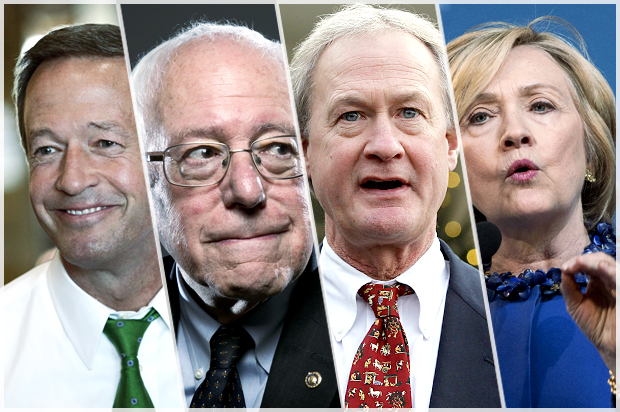There are approximately 14 billion Republicans vying for their party’s nomination, so the Democratic field looks comparatively lean at three declared candidates. But that’s triple what it was two months ago, and will expand again this week. Hillary Clinton was the first to announce back in April, with Bernie Sanders launching his own campaign at the end of that month. After much speculation, former Maryland Gov. Martin O’Malley made it official on Saturday and former Rhode Island Gov. Lincoln Chafee is set to formally announce on Wednesday.
With four candidates (and counting) in the running, it’s as good a time as any to size them up to see how the positions they’re staking out may steer the debate or pull her or his opponents in one direction or the other. As the campaigns kick into gear, Salon will take a look at what each candidate is saying about some of the issues people are watching closely and what those positions might mean in the context of the rest of their platform. Because treating climate change, the minimum wage or criminal justice reform as distinct issues from, say, poverty, the social safety net and public education doesn’t make any sense. So let’s stop talking about them that way.
Let’s try it out with the minimum wage.
Clinton: Supports a boost to the minimum wage, but is murky on just how much of a boost. There’s speculation that she’ll back a proposal for $10.10 or even $12 an hour, but she hasn’t come out in favor of $15, the floor being advocated by organizers in the Fight for $15 movement and the SEIU.
A sampling for her supportive-but-vague rhetoric: In April, she tweeted support for striking workers, specifically shouting out fast food and childcare workers who “shouldn’t have to march in streets for living wage.” Earlier this month, she told a crowd in Chicago (a city that voted to raise its minimum wage to $13 by 2019):
We have to stand firmly together and united on behalf of your right to organize, your right to bargain collectively, your right to fight for the higher wages that reflect the value of your work.
Sanders: Supports $15, and also wants the United States to be a Scandinavian dreamscape.
Here’s Sanders on why $15 is a “minimum”:
Well it wasn’t what I chose, I think it’s what the sentiment is all over this country. And the answer is that if you do the arithmetic and people have to pay rent, have a car, and take care of their kids, and provide heat, and buy food and buy medicine, that’s what it takes as a minimum to live a decent life.
O’Malley: Supports $15. As governor of Maryland, supported legislation to raise the states minimum wage to $10.10 by 2018 because that was “the furthest I could push it and still get the consensus to get it done.”
Here’s O’Malley during a speech at Harvard University when he publicly backed the Fight for $15:
As we gather here tonight, wealth and economic power in the United States of America have now been concentrated in the hands of the very few as almost never before in the history of our country… the vast majority of us are working harder but we’re watching our families slipping further behind.
Chafee: Supports an increase, unclear on specifics. As governor of Rhode Island, he signed a measure in 2014 bumping the state’s minimum wage from $8 to $9.
Calls raising the minimum wage “one component of helping the struggling middle class” and shouted out the Pope as leading the issue globally.
So what does it all mean, man?
The Democratic party has woken up on the minimum wage, so that each of the candidates would either vaguely or directly support a boost isn’t that surprising. But what’s worth looking at, especially since it seems that $15 is the highest any candidate is currently willing to go, are the other policies they’re backing and what that might mean for wages.
The Fight for $15 has moved the center on the issue, pushing retailers like Target and Wal-Mart to raise their wages and forcing the issue into focus for Democrats and Republicans. Those victories aren’t just putting actual dollars in peoples’ pockets, they are also building out a movement that can play a long game — looking toward a future when an actual living wage might be politically possible.
Because as powerful a movement as it may be, $15 an hour isn’t really a living wage in most places, especially not if you have a family or are paying down student debts.
Here’s a quick breakdown from the Atlantic on a new report that found that $15 an hour doesn’t cut it in most places:
The report’s calculations back up its claim. Currently, an average American needs to earn $19.35 to afford rent on a two-bedroom unit. That’s a few dollars more than the $15.16 average hourly wage earned by the average American renters, and 2.5 times the federal minimum wage. It’s also more than the median hourly wage of the the average American worker, which is $17.09. For 13 states home to cities with skyrocketing rents — including California, Washington, New York, and Virginia — a person would have to earn well above $20 per hour to afford a two-bedroom place.
So what could make $15 a living wage, or at least a slightly more livable wage? A robust social safety net. Affordable housing and childcare. Free preschool and college free so that parents and children won’t be saddled with debt in order to get a basic education.
Where do the candidates stand on these issues? Do they even have a stand on these issues? Stay tuned to find out! (Just kidding — kind of. But this is going to be a series, so maybe come back and read more.)

